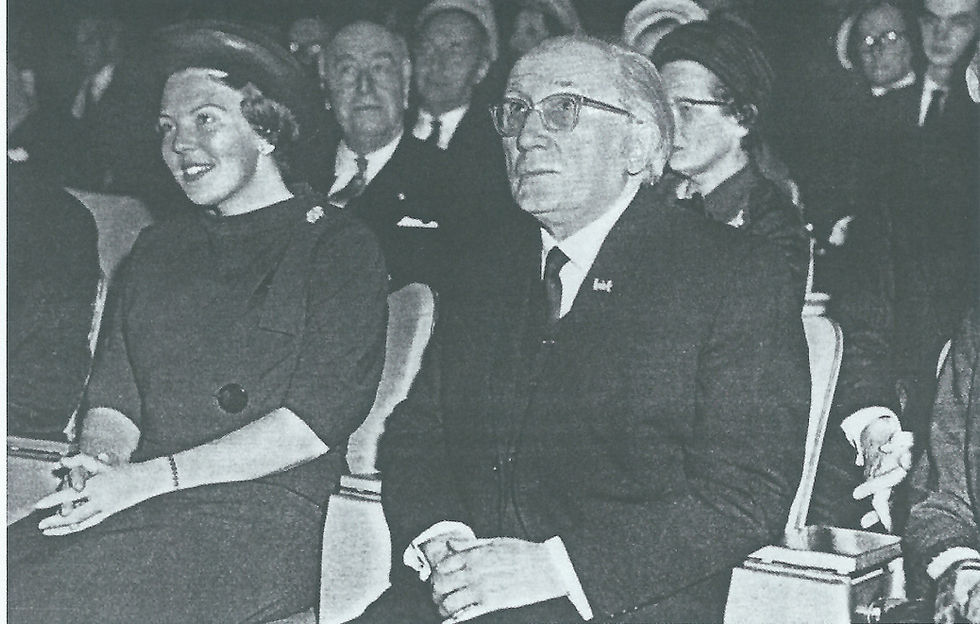Living in the Shadow of Death
- Robert Mixa

- May 4, 2024
- 4 min read
Updated: Jul 4, 2024
Death is a distant rumor when you are young. But the death of a loved one brings a consciousness of the end as near even for the youth.
While not personally devastating to me, the death of my maternal grandpa a couple of years before I was born shaped me in more ways than I can tell. I grew up very close to both sides of my family, and I practically grew up in both my grandparents’ homes. Pictures of my deceased grandpa were everywhere in my grandma’s house, and I was often reminded, especially by my mom, of how much I am like her dad. And while I took it as a complement to know that I was like such a beloved man, this knowledge scared me that I would also die of a heart attack at an early age.
My mom often recited the story of my grandpa’s death. After attending Mass and helping some parishioners disassemble the stage of the previous night’s parish event, my grandpa went home to get something, intending to return for a parish breakfast where my mom and her family awaited him. But he never arrived. My grandpa had a heart attack while he was at home by himself. He was able to call the ambulance, which took him to the hospital. But it was too late. He died on the way to the hospital. My mom, a nurse, upon arriving at Christ Hospital immediately said to the doctor, “My dad is dead, right?” He confirmed. My grandma went into total shock. After leaving the hospital, my young aunt let out a hysterical cry of sorrow in the parking lot. My family was forever shaped by this event, and so was I.
I heard this story from my mom almost a million times when I was growing up. She still talks about it. But the older I get and each time I get worried about the news of my high cholesterol, I am reminded of my grandpa. Will I, too, die young?
While such knowledge reminds me to eat well, sleep, and exercise, it also sets into relief questions of ultimacy and purpose: What am I living for? What ought I to live for? What is all this creation for? Strangely, death compels us to ponder the worth of life. That cranky German, Schopenhauer, was surely right when he said, “Mostly it is loss which teaches us about the worth of things.”
Yet many of us in the bourgeois West do not heed the lesson. We tend to hide death, often finding the worth of life in the deceased’s assets of which we hope to be beneficiaries. As the Book of Ecclesiastes notes, the wealth that we spent most of our days toiling for is given to someone who did not toil. Let that sink in. Sadly, many of us will leave everything to people who are ungrateful and will not remember us.

I once heard a story about an old man who spent his entire life toiling away and amassing wealth that he did not spend. He kept repeating the words “it is not worth it…it is not worth it” on his deathbed. People who knew him well think it was likely an Ecclesiastes-like lament.
Which brings into focus: what is worth it?
Questions of highest worth in life remind me of Paul’s Letter to the Romans in which he writes, “If we live, we live to the Lord [emphasis mine]. If we die, we die to the Lord. So, whether we live or die, we belong (’εσμεν - to exist) to the Lord” (Romans 14:8).
Fundamentally, being “to the Lord” is what we do in the liturgy, which should orient the whole of our life. The Spirit inspires us to live in the Son who relates us to the Father, permitting us to say “our Father.” This liturgical stance is also an eschatological stance, for thereby we orient ourselves to the end (the Kingdom) in which we hope. The Kingdom is already present among us but not fully manifested yet. By its standards we will be judged. To better partake in its life we will be purified.
The liturgy is simultaneously a preparation and realization of life in the Kingdom. But many in the Church are dead to this.
One of my reasons for starting the Spe Salvi Institute is to wake the Church up to its eschatology and reflect on the culture that takes form around such “eschatological consciousness” which Russian theologian Fr. Alexander Schmemann thought was missing in the Church in the secular West. If an eschatological consciousness is present, it is very often not Christian but Marxist, transhumanist, or technocratic. Accordingly, one of the great tasks of the Church today is to remember our end and more consciously live to the Lord.
That my grandpa died right shortly after attending Mass has associated death and liturgy in my mind. This seems appropriate for in it we partake in Christ’s death. I just hope that my grandpa was able to bring the logic of the liturgy into his final act on earth. I hope the same for myself.
The ritual of telling the story of his death has made me conscious of that eschatological horizon to which we are all moving. And whether God grants me a long or short life I count it a blessing that this story has reinforced the need to be prepared. May this venture reinforce that for us all.






Comments